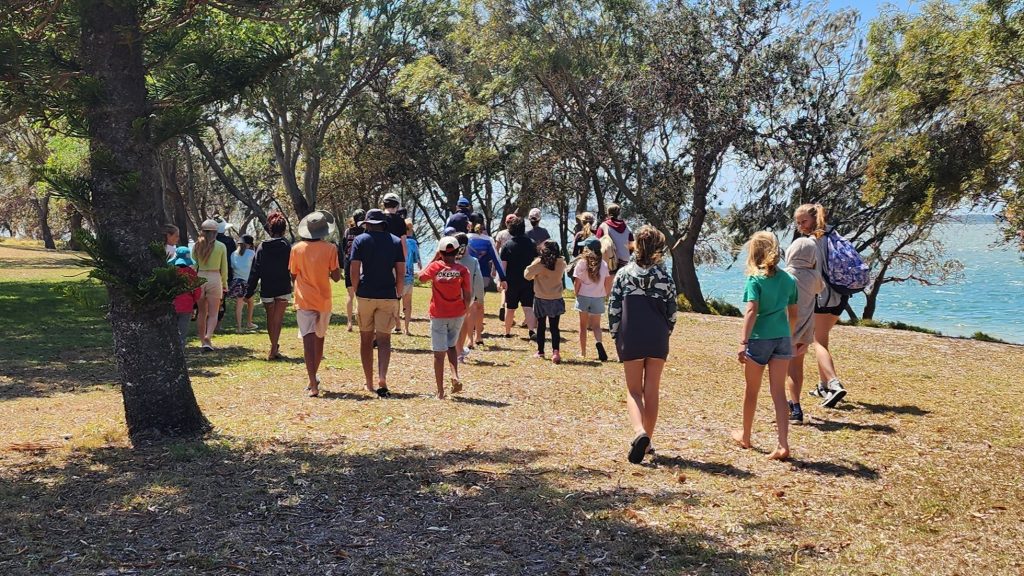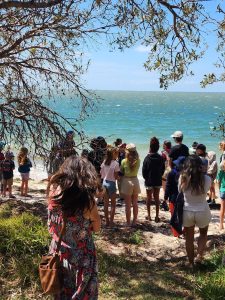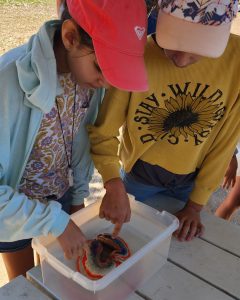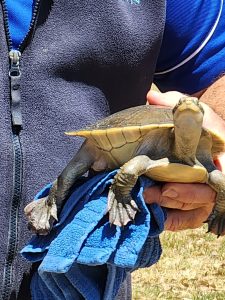
On a very windy but sunny Wednesday in October, Ocean Life Education’s Senior Marine Biologist, Richard Coward, facilitated a wonderful ‘Coastal Habitats’ focused educational excursion for the Bribie Island Home School group, with the help of the lovely Taz Winkler of Pumicestone Homeschoolers…
Educative Ocean Walk
As the tide was quite high and still coming in, we decided to run our Mangrove/Beach Habitat educative walk before the live  marine animal exhibit session, in order to maximise on beach time and find as many wildlife remnant treasures as possible!
marine animal exhibit session, in order to maximise on beach time and find as many wildlife remnant treasures as possible!
We walked the group to the beach where we discussed the importance of the mangrove and other beach habitats and why we need to protect them. We also noticed evidence of another habitat washed up on the beach…sea grass!
Seagrass & Mangrove Habitats are very important nursery areas for many of the creatures we find in our ocean and on our beaches, as well as being home to some iconic marine animals such as sea turtles, dugongs and the beautiful mangrove jack (a type of snapper).
Whilst walking, the children found many cool marine oddities such as a ‘sand collar’ (the jelly-like casing for moon snail eggs). We also discovered a sea urchin test (the brittle shell remnants of a sea urchin), blue blubber sea jellies – aka jelly fish (which they aren’t – as they are not a fish but belong to the same group of animals as corals and sea anemones). Then there was the interesting vegetation such as the mangrove seed pods washed up on the beach, including one that had recently anchored and germinated….the exciting beginning of a new mangrove tree right there before us!
To complement the student’s prior theoretical homeschool learning, we discussed the flow of energy from one habitat to the other, and the fact that different habitats are connected. They were very enthusiastic and already had solid background knowledge of the aquatic environment and its inhabitants from their homeschool studies.
Live Marine Exhibits & Interpretation 
The second part of the excursion took place in a pretty undercover area and focused on our team of live marine animals.
We discussed the creatures in great detail, examining adaptive traits and how all animals look and feel the way they do for a reason. We then explored what roll the animals played in their respective habitats and why we need to look after them and human impact on their environment.
Shark Artefacts
The group was fascinated by our jawsome! (sorry!) sharks presentation which focused on our impressive collection of shark jaws. They learnt that shark teeth differ greatly in both size and shape, the reasons why and the varying diets that sharks have.
At Ocean Life Education, we like to use the term ‘Amazing Sharks’ so we discussed why we believe sharks are amazing,  including their key role in ocean food chains and how they keep the ocean healthy by eating sick or dead animals and keeping numbers of other ocean dwellers in check.
including their key role in ocean food chains and how they keep the ocean healthy by eating sick or dead animals and keeping numbers of other ocean dwellers in check.
The children also understood that sharks are not interested in eating people….however on very rare occasions they might make a mistake and bite into a human thinking it is a regular food source, such as a seal or large turtle. Together we examined why we need sharks in the ocean and why we believe that sharks deserve some positive PR for a change!
Thank you to an Awesome Group!
We had a fantastic time on this Coastal Habitats Educational Excursion with a bunch of upper primary to early secondary school aged kids who were polite, enthusiastic and had substantial knowledge of the marine environment. It was a pleasure to share this experience with a group of wonderfully appreciative home school kids!
Thank you to Pumicestone Homeschoolers for having us!
Further reading…

